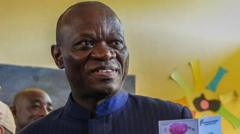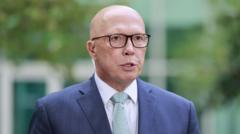Tidjane Thiam, the former CEO of Credit Suisse and a prominent figure in international finance, has announced his intent to run for president in the upcoming elections in Ivory Coast.
Tidjane Thiam Declares Candidacy for Ivory Coast Presidency

Tidjane Thiam Declares Candidacy for Ivory Coast Presidency
Former Credit Suisse leader seeks to make a political impact after years abroad.
Former Credit Suisse CEO Tidjane Thiam is set to make a political comeback as he declares his candidacy for the presidency of Ivory Coast in the upcoming election. The political party backing him, the PDCI, confirmed his status as the only candidate from this major opposition party. Thiam, 62, has spent over two decades living outside Ivory Coast, including significant time engaged in high-profile business roles in the UK and abroad. In order to qualify for the presidential race, he renounced his French citizenship, a move illustrating his commitment to Ivorian politics.
Despite his international business stature—including leadership positions at firms such as Aviva and Prudential—political analysts indicate that Thiam remains largely unknown to many Ivorians due to his extended absence from the country. Political scientist Geoffroy Kouao stressed the importance of a robust campaign if Thiam hopes to connect with voters ahead of the elections in October. Meanwhile, the ruling RHDP party has not yet announced its candidate for the election, though current president Alassane Ouattara, 83, is expected to seek a fourth term.
Thiam’s career has been marked by both triumphs and controversies; he was the first Ivorian to gain admission to France's elite Polytechnique engineering school and subsequently entered politics as planning minister in the late 1990s. However, after a coup ousted his party from power, he relocated abroad and enjoyed considerable success in the corporate world. Notably, he became the first black CEO of a FTSE 100 company when he took the helm at Prudential, although his tenure was later marred by regulatory inquiries. His leadership at Credit Suisse ended amid a scandal involving allegations of corporate espionage, which he has denied.
With deep roots in political lineage—being the great-nephew of the late Félix Houphouët-Boigny, Ivory Coast's first president—Thiam is positioned to leverage his connections in West African politics as he embarks on his presidential campaign.
Despite his international business stature—including leadership positions at firms such as Aviva and Prudential—political analysts indicate that Thiam remains largely unknown to many Ivorians due to his extended absence from the country. Political scientist Geoffroy Kouao stressed the importance of a robust campaign if Thiam hopes to connect with voters ahead of the elections in October. Meanwhile, the ruling RHDP party has not yet announced its candidate for the election, though current president Alassane Ouattara, 83, is expected to seek a fourth term.
Thiam’s career has been marked by both triumphs and controversies; he was the first Ivorian to gain admission to France's elite Polytechnique engineering school and subsequently entered politics as planning minister in the late 1990s. However, after a coup ousted his party from power, he relocated abroad and enjoyed considerable success in the corporate world. Notably, he became the first black CEO of a FTSE 100 company when he took the helm at Prudential, although his tenure was later marred by regulatory inquiries. His leadership at Credit Suisse ended amid a scandal involving allegations of corporate espionage, which he has denied.
With deep roots in political lineage—being the great-nephew of the late Félix Houphouët-Boigny, Ivory Coast's first president—Thiam is positioned to leverage his connections in West African politics as he embarks on his presidential campaign.





















